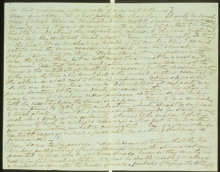Page 4
or this ignorance at any rate I am not to blame. Then you say - "It is not possible that there should be much more at best than a benevolent neutrality shown by your people towards ours. There is so very minute a point of contact between the two civilizations they respectively represent that one might almost say they could not touch at all" Now is this correct? Is it not in the first place misleading to talk of two civilizations? All civilizations have the same necessary ingredients, mental & moral (or if you prefer it a spiritual) culture. The one element may predominate here, the other there, but in both cases there must be a vast am[oun]t in common. Essential to every civilization in any way deserving of the name is the intellectual culture necessary for the discrimination of the good, the true & the beautiful & the moral culture essential to the adherence at all cost to these in preference to their opposites. In the one country there may be less intellectual capacity & a purer devotion to the more dimly perceived truths, in the other it may be more of "Meliora videon proboque, deteriora sequor" but in both the essentials are the same & it appears to me to be a contradiction in terms to talk of two civilizations which may almost be said not to touch at all. Nor is this a mere matter of words for starting with such idea's failure is a certainty, whereas if the vast am[oun]t that is common to both be realized & recognized & if we seek to build on this common foundation, an active cooperation in lieu of a benevolent neutrality becomes not only a possibility, but is a thing that may be commanded.
Then I come to the passage, "Has it occurred to you that the two Bombay publications if not influenced may at least have not been prevented by those who might have done so because they saw the necessity for that much agitation to effect the double result of making a needed diversion after the brooch grenade, & perhaps of trying the strength



"Video meliora, proboque, deteriora sequor" is a Latin phrase found in the writings of the Roman poet known as Ovid, meaning "I see better things, and approve, but I follow worse."